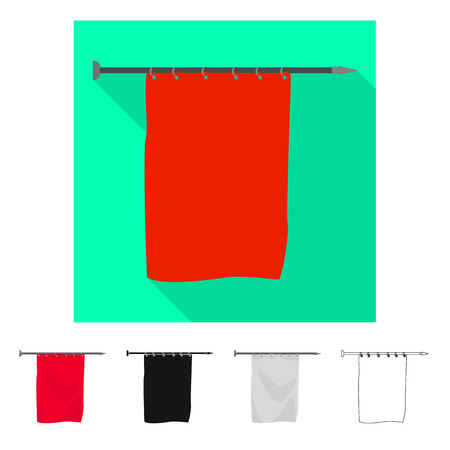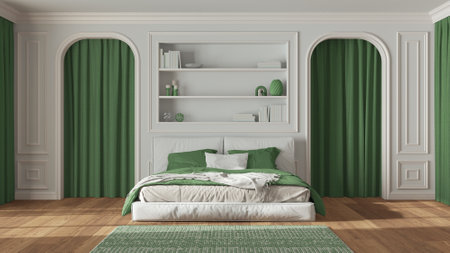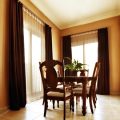Introduction to Sustainable Curtains
In recent years, sustainability has become a central theme in the UK home decor sector, driven by heightened awareness of environmental issues and a growing demand for eco-friendly living solutions. British homeowners are increasingly mindful of the environmental impact their choices make, leading to a surge in sustainable interior options—including curtains. As an essential element of every household, curtains now reflect not just personal style but also values regarding resource conservation and responsible consumption. The table below provides an overview of key factors influencing sustainability in UK home decor:
| Key Sustainability Factor | Environmental Impact | Consumer Demand in the UK |
|---|---|---|
| Material Sourcing | Reduces deforestation and water usage through natural or recycled fabrics | Increasing preference for organic cotton, hemp, and recycled polyester |
| Production Methods | Lowers carbon emissions and chemical use during manufacturing | Interest in locally made or ethically produced goods |
| Product Longevity | Minimises waste with durable, high-quality construction | Growing focus on long-lasting products over disposable alternatives |
This shift towards sustainability is not merely a trend but a reflection of broader societal changes, as UK residents seek to align their homes with environmentally conscious lifestyles. Eco-friendly curtain choices serve as a practical entry point for households looking to reduce their carbon footprint while maintaining modern aesthetics and comfort.
2. Popular Eco-Friendly Curtain Materials
When selecting sustainable curtains for modern UK homes, it is essential to consider materials that are both environmentally friendly and suitable for the unique British climate. Below is an analysis of popular eco-friendly curtain materials commonly available in the UK market.
Organic Cotton
Organic cotton is cultivated without synthetic pesticides or fertilisers, reducing harm to the environment and supporting biodiversity. In addition, organic cotton curtains offer excellent breathability and softness, making them ideal for UK homes seeking a comfortable yet eco-conscious option.
Linen
Linen, derived from the flax plant, requires minimal water and chemicals during production. Its natural fibres are highly durable and provide effective insulation against both heat and cold—an important consideration given the UKs variable weather conditions. Linen curtains are also hypoallergenic and biodegradable, adding to their sustainability credentials.
Bamboo
Bamboo is a rapidly renewable resource that grows quickly without the need for chemical intervention. Bamboo fabrics are naturally antibacterial, moisture-wicking, and highly resilient. These properties make bamboo curtains a practical choice for UK households aiming to reduce their environmental footprint while maintaining high indoor air quality.
Recycled Fabrics
Recycled polyester and other reclaimed fibres help divert waste from landfills by repurposing existing materials. These fabrics can mimic the appearance of traditional textiles while offering enhanced durability and ease of maintenance. Curtains made from recycled materials align with circular economy principles and support sustainable living in urban and rural UK settings alike.
Comparison Table: Eco-Friendly Curtain Materials
| Material | Environmental Benefit | Suitability for UK Climate |
|---|---|---|
| Organic Cotton | Chemical-free cultivation; supports biodiversity | Breathable; suitable for year-round use |
| Linen | Low water usage; biodegradable | Excellent insulation; handles humidity well |
| Bamboo | Fast-growing; minimal chemical input | Moisture-wicking; good for damp climates |
| Recycled Fabrics | Reduces landfill waste; promotes recycling | Durable; versatile for various room types |
Summary
Selecting from these sustainable curtain materials allows UK homeowners to make environmentally responsible choices without sacrificing practicality or style. Each material offers specific advantages suited to British weather patterns and design preferences, ensuring long-term comfort and energy efficiency within the home.

3. Energy Efficiency and Thermal Curtains
Energy-efficient curtains, often referred to as thermal curtains, play a pivotal role in enhancing the sustainability of modern UK homes. By providing an additional layer of insulation, these curtains help to minimise heat loss through windows—a common issue in both period properties and new builds across the country. Effective insulation not only supports more consistent indoor temperatures but also contributes directly to lowering household heating bills, which is especially significant given the UKs variable climate and rising energy costs.
The Role of Thermal Curtains in Insulation
Thermal curtains are typically constructed with multiple layers, including a dense core that acts as a barrier against draughts and cold air ingress. This design reduces reliance on central heating systems during colder months, helping homeowners meet energy efficiency targets set by UK regulations and policies aimed at reducing carbon emissions. The table below outlines the key benefits of incorporating thermal curtains into your home:
| Benefit | Description |
|---|---|
| Improved Insulation | Reduces heat loss by up to 25%, keeping interiors warmer for longer. |
| Lower Heating Bills | Decreases reliance on gas or electric heating, resulting in measurable cost savings. |
| Sustainability Alignment | Supports national goals for carbon footprint reduction and energy conservation. |
Supporting the UK’s Sustainability Goals
By choosing sustainable and eco-friendly curtain options—such as those made from recycled materials or responsibly sourced fabrics—homeowners further contribute to the UKs broader environmental objectives. Modern curtain manufacturers increasingly offer solutions that blend thermal performance with sustainable production practices, ensuring that style, comfort, and ecological responsibility go hand-in-hand. Adopting energy-efficient curtains is thus not only a practical investment but also a conscious step towards a greener future for UK homes.
4. Certifications and Ethical Standards
When selecting sustainable and eco-friendly curtains for modern UK homes, it is essential to consider not only the materials but also the certifications and ethical standards underpinning their production. The UK market highly values transparency and responsible sourcing, with several internationally recognised certifications offering reassurance to environmentally-conscious consumers. Below is a comparison of the most relevant eco-certifications trusted in the UK:
| Certification | Description | UK Relevance |
|---|---|---|
| GOTS (Global Organic Textile Standard) | Ensures textiles are made from organic fibres with stringent environmental and social criteria throughout the supply chain. | Widely recognised by UK retailers and consumers seeking organic products. |
| OEKO-TEX Standard 100 | Certifies that textiles are free from harmful substances, focusing on consumer safety. | Highly trusted in the UK for health-conscious households and safe childrens products. |
| Fairtrade Textile Standard | Promotes fair wages, safe working conditions, and environmentally friendly practices. | Appeals to ethically-minded buyers in the UK prioritising worker welfare. |
| FSC (Forest Stewardship Council) | Assures wood-based curtain components originate from responsibly managed forests. | Important for curtain poles or accessories sourced with sustainability in mind. |
Ethical Production Practices Recognised in the UK
Sustainable curtain choices go beyond material selection; ethical manufacturing is increasingly central to the purchasing decisions of UK homeowners. Practices such as ensuring living wages, supporting local artisans, using renewable energy in production facilities, and transparent supply chains all contribute to a more ethical textile industry. Many UK brands proudly highlight their commitment to these values, enabling consumers to make informed choices aligned with both environmental responsibility and social justice.
How Consumers Can Verify Certifications
To ensure authenticity, consumers should look for official certification logos on product labels or request documentation directly from suppliers. Reliable retailers often provide detailed information on their websites regarding certified products, helping buyers confidently select curtains that meet stringent UK sustainability standards. By prioritising certified and ethically produced curtains, homeowners contribute positively to both their living spaces and the wider global community.
5. Styling and Integrating Sustainable Curtains in Modern UK Homes
When selecting eco-friendly curtains for contemporary British homes, it is essential to align style choices with current interior design trends while maintaining a commitment to sustainability. Modern UK interiors often blend functionality with minimalistic elegance, making the choice of curtain material, colour, and pattern crucial. Below is a practical guide to help homeowners seamlessly incorporate sustainable curtains into their living spaces:
Matching Curtain Materials to British Interior Trends
| Interior Style | Recommended Sustainable Curtain Material | Key Features |
|---|---|---|
| Scandi Minimalism | Organic Cotton or Linen | Lightweight, neutral tones, soft textures |
| Industrial Chic | Recycled Polyester Blends | Durable, easy-care, muted hues |
| Classic Victorian | Bamboo or Hemp Fabrics | Natural sheen, strong drape, period charm |
| Modern Eclectic | TENCEL™ Lyocell or Upcycled Fabrics | Vivid prints, unique textures, statement pieces |
Colour Schemes and Patterns: Sustainable Choices for UK Lifestyles
Selecting colours that reflect the British climate and lifestyle can enhance comfort and energy efficiency. Opt for earthy greens, soft greys, and pastel blues to create a calming atmosphere that complements natural lighting—an important factor given the UKs variable weather. For patterns, understated geometric or botanical designs work well in both traditional and modern settings.
Lifestyle Integration Tips
- For family homes, choose machine-washable organic fabrics that withstand daily wear.
- If privacy is key (e.g., terraced houses), select heavier sustainable weaves like hemp or lined organic cotton.
- Urban flats benefit from lighter shades and sheer eco-friendly materials to maximise light flow.
Professional Guidance for Seamless Results
Engage with reputable local suppliers who specialise in sustainable textiles. Many offer bespoke services tailored to UK window sizes and can advise on combining curtain solutions with energy-efficient linings for added insulation—a must for British winters. By thoughtfully integrating eco-friendly curtains with contemporary décor preferences, homeowners not only support environmental responsibility but also enjoy stylish, comfortable living spaces suited to modern UK life.
6. Where to Source Sustainable Curtains in the UK
For homeowners seeking to invest in sustainable and eco-friendly curtains, the UK market offers a robust selection of trusted suppliers ranging from established high street names to specialised independent retailers. To streamline your sourcing process, we have curated a directory-style overview of reputable options that prioritise environmental responsibility, product transparency, and modern British style. The following table categorises some of the most reliable sources:
| Supplier Type | Name | Key Features | Location/Availability |
|---|---|---|---|
| High Street Brand | John Lewis & Partners | Organic cotton, recycled polyester options, BCI-certified textiles | Nationwide stores & online |
| High Street Brand | Dunelm | Sustainable range, OEKO-TEX® certified fabrics, affordable pricing | Nationwide stores & online |
| Independent Retailer | The Natural Curtain Company | Bespoke curtains, natural fibres, low-impact dyes | Online UK-wide |
| Eco-Conscious Specialist | Green Curtains UK | Handmade-to-measure, organic hemp & linen, plastic-free packaging | Online UK-wide |
| Local Supplier Directory | Etsy UK Sellers (various) | Small-scale artisans, upcycled materials, custom orders possible | Online with local filtering options |
What to Consider When Choosing Your Supplier
- Look for clear information on fabric sourcing—prefer suppliers who disclose certifications such as GOTS or OEKO-TEX®.
- Prioritise companies offering made-to-measure services to minimise waste and ensure a perfect fit for your windows.
- Support local makers or businesses where possible to reduce carbon emissions associated with shipping.
Legal and Ethical Considerations for Purchasers in the UK
Under UK consumer law, you are entitled to clear labelling regarding fibre content and care instructions. If purchasing bespoke or made-to-order items online, ensure you review cancellation rights and lead times as per the Consumer Contracts Regulations 2013. For larger projects or commercial properties, it may be advisable to request detailed product data sheets or sustainability statements from your supplier.
Summary Table: Sourcing at a Glance
| Sourcing Option | Sustainability Focused? | Bespoke Service? | Main Shopping Channel |
|---|---|---|---|
| John Lewis & Partners/Dunelm | Yes – selected ranges only | No/Yes (depends on service) | High street & online retail |
| The Natural Curtain Company/Green Curtains UK/Etsy Artisans | Yes – all products focused on sustainability and ethics | Yes – custom sizing available | Online direct order |
This diverse marketplace ensures that every homeowner can find sustainable curtain solutions tailored to both their aesthetic preferences and ethical standards—whether shopping conveniently on the high street or supporting independent eco-conscious craftspeople across the UK.


